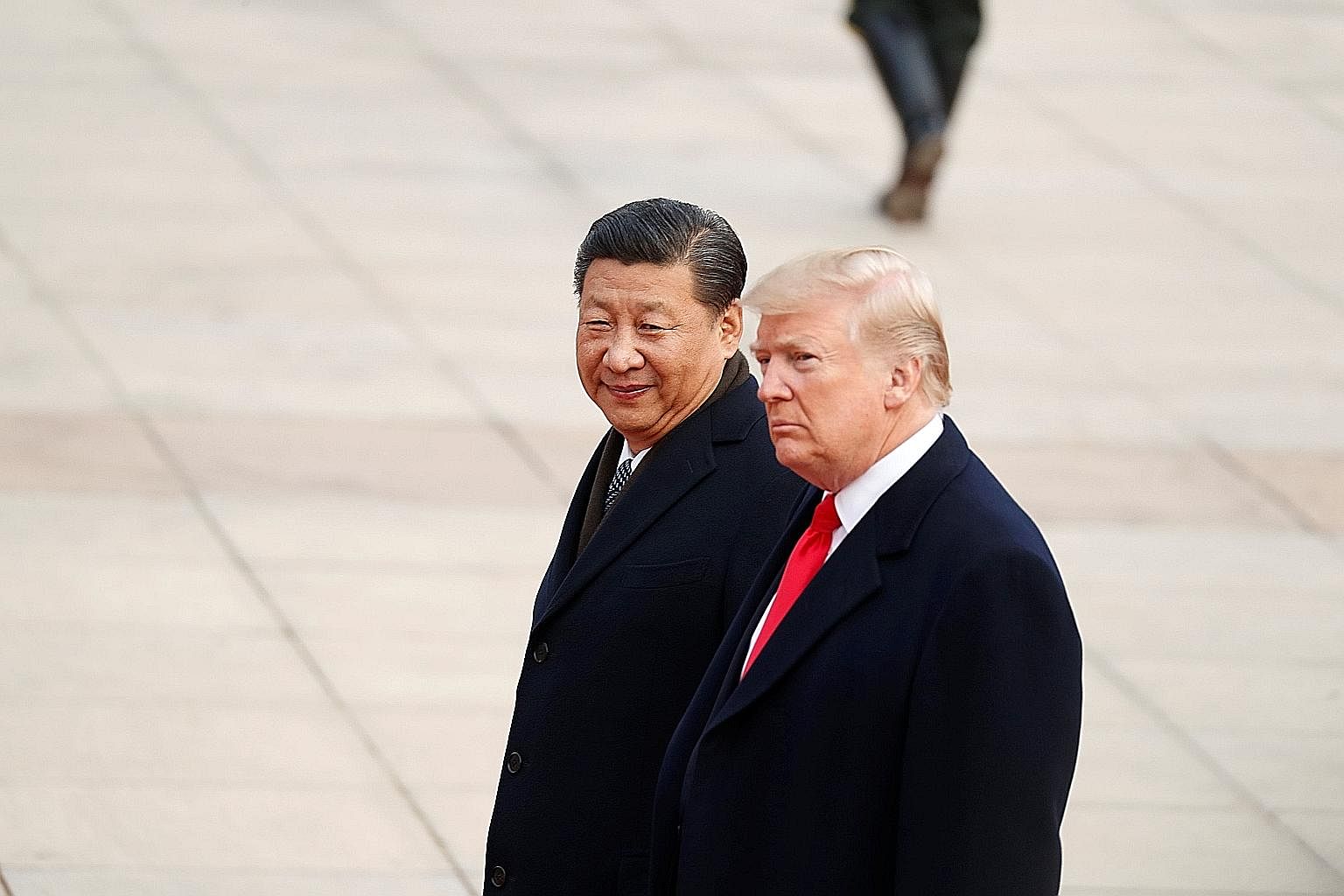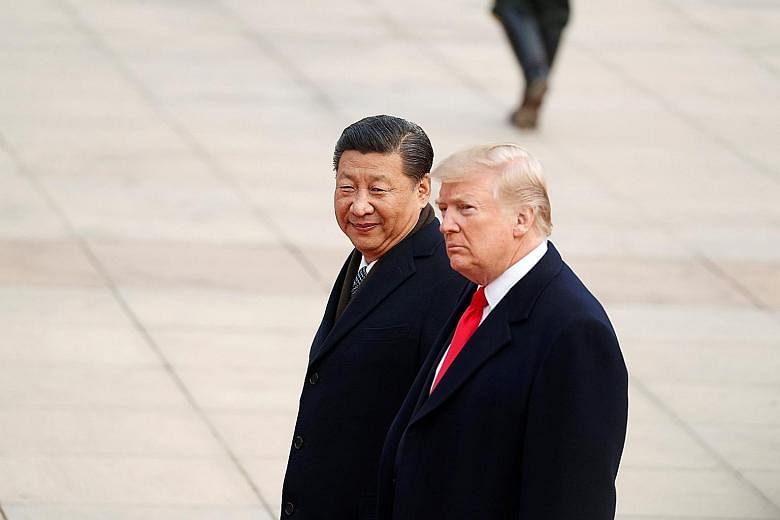Q What is the logical flaw in President Donald Trump's pet argument that many countries have been taking advantage of generous US foreign aid and trade policies to run up huge trade surpluses? What is the basis for the moral outrage expressed in some quarters over America's alleged "isolation" from the world? Can this be traced to decisive US interventions in the world wars, the security its navy has provided on the sea lanes, or does it go further back to its calling to be as the "city upon a hill" to the world, an idea which was expressed in the founding documents and embraced by most conservatives and some liberals to this day? After all, why should America aid Egypt, South Sudan or Pakistan?
A It goes back to very old notions of American exceptionalism, a conviction that the United States is the indispensable nation. That was enshrined in its founding documents, and apparent in the America that (the 19th century political theorist) de Tocqueville admired. It was symbolised in the Statue of Liberty, a tower of welcome rather than of power. But the global impact did not come until the British and continental Europeans were no longer willing and able to play their multidimensional international leadership model. The spasms that produced two world wars would have occurred differently had the US already embraced something closer to its Cold War role than to Teddy Roosevelt's old-world drive for international "manifest destiny". (Editor's note: Manifest destiny refers to the idea that the US had both the right and duty to be powerful and extend its influence to safeguard its own interests.)
It is worth remembering how deeply reluctant Americans were to enter both World War I and World War II - and what a large role it played in the US politics of the time. The true origin of "America First" lies there.
Those great wars created something close to consensus in Washington that peace and prosperity for Americans depended on US investment in peace and prosperity everywhere else. The US spent to rebuild both its allies and former enemies after World War II. It created a new global model - for the economy, for security and, most importantly, for liberal democracy. That model, and the emphasis it placed on the rights of the individual, helped ensure the downfall of the Soviet Union.
But the Americans "lost" Russia... because there was no political will for any sort of Marshall Plan for Moscow. Americans, and therefore their politicians, were more interested in the peace dividend they felt they were owed as the US put down some of its international burdens. Remember, too, that the very last days of the Cold War coincided with a recession for the US economy.
Today, there are those who say, and those who believe, that the US has no special responsibility to other countries that extends beyond a best effort to offer a positive example.
Q During the mid-October party congress in China, President Xi Jinping heralded the dawn of a new era and promised a more "high-spirited" foreign policy. He is holding up China as a model for nations who want to develop independently of the West. Central to his vision are Chinese values. What are the implications of this shift in Chinese policy for Asia? Will it mean that China will, say, expect more "deference" from smaller nations in the region?
A It means that China's development has reached a stage at which it is now publicly prepared to play a leadership role on the international stage. No more talk in Beijing of China as the still-fragile developing country.

I don't believe that Chinese values are central to China's foreign policy, though they are certainly central to Mr Xi's domestic plans and his "China dream". Instead, China's preoccupation is with sovereignty. Just as Cold War-era US policymakers believed that promotion of the universal idea of empowering the individual would speak to many of the world's people, China's leaders are convinced that ties based on both development and non-interference in the internal affairs of others will speak to many of the world's governments.
"Don't try to change us, and we won't try to change you." That's not about values. It's about interests.
China expects to set rules, and Beijing expects other countries to accept that this is China's right as the dominant power. If they don't, China will use economic muscle to get what it wants. We are seeing that now with China's approach to South Korea. That model will extend across Asia in the coming years.
Q What kind of US response would you like to see to the "new Chinese era"? And what do you expect to see of the Trump Administration?
A I would like to see the US lead by example. I would like for America to "practise what it preaches", to uphold values and set standards at home that others want to emulate. Today, US entrepreneurship and technological development set high standards, but the erosion of integrity within some American political institutions will become a source of profound longer-term weakness.
I would like to see the US work with capable and like-minded allies to nudge China towards a more constructive international relationship with others. That is why the Trans-Pacific Partnership is such an important missed opportunity. I would like to see a sustained effort to foster greater trust among nations in cyberspace - and to coordinate regulatory policy on information technology, on big data, and so on - at least among advanced industrial democracies.
I expect to see Mr Trump take a harder line on China, with a series of tougher trade moves, in particular. But I expect virtually all of them to be unilateral, without much support from allies, which badly undermines their impact.
Q Elections in 2017 saw Mr Shinzo Abe seek and receive the mandate to tackle a nuclear North Korea with a more robust military policy. How will a more assertive Japan alter equations in Asia? Will 2018 be the year when we see Japan have defence forces like any other country, rather than "self-defence" forces?
A It is remarkable that Mr Abe is the strongest political leader in the developed world today, but a move to change Japan's Constitution will take more time. I think 2018 will bring incremental increases in military spending and closer cooperation with the US. Perhaps as importantly for the long term, Japan will continue to improve ties with India, but Mr Abe's focus will remain primarily economic. That bodes well for the stability of Japan's relationship with China.
Q Do you see India returning to a high-growth trajectory in the remaining years of the Modi government?
A Absolutely. His party just won important elections in his home state of Gujarat, and while he does not have a majority in the Upper House, he is still the strongest governing force that India has seen in decades. The goods and services tax will create more efficiency. There will be more spending on infrastructure. Various changes, some technological, will limit corruption at the highest levels of government, which will also boost economic performance.
I would be very surprised if we do not see more high growth in India in the coming years.
Q Are we now witnessing the beginning of the disintegration of the European Union? Germany, the engine of EU, is still unable to form a stable government after Chancellor Angela Merkel's poor electoral performance. Other jolts have come from the separatist movement in Catalonia, the growing support for independence in Scotland, and the disquiet at the Irish border after Brexit.
A No. Brexit, and the trouble it has created for Britain, has made euroscepticism much less attractive across the continent. Anti-establishment sentiment is clearly still a factor in almost every European country. Fear of refugees and anger over immigration policy continue. But this simply means that there is an erosion of the values that have bound Europe together, as in the US. This is not the same as a desire to dismantle the EU itself. Or even the euro zone. In Poland and Hungary, where right-wing anti-immigrant politics have taken root and where conflicts with Brussels are intensifying, there is no public demand for exit.
It is just unfortunate that European leaders have no public mandate to take up some of the heavier burdens of international leadership that Washington has set down.
Q In allowing the creation of Israel in 1948, do you think the United Nations had in effect given sanction to the idea of a religious home for Jews and that the recognition of Jerusalem as its capital is an extension of this idea. How would you characterise the US decision to move its embassy from Tel Aviv to Jerusalem - is it wrong, bad statecraft, harmful to US interests in the region or merely inopportune?
A It is less important than it would have been 10 to 15 years ago.
Mr Trump's announcement on Jerusalem has much more to do with domestic politics than with any concerted effort to change the Middle East. Nor can Palestinians do much about this because, while Arab governments are publicly friendly to their cause, they are more concerned with Iran and threats within their own borders than about Israelis and Palestinians.
Q How do you see Prince Salman's attempt to recast Saudi Arabia, especially his pledge to return the nation to moderate Islam? What are the likely repercussions for nations with Islamic populations? How will the reforms impact Riyadh's rivalry with Teheran?
A The pledge to return the nation to moderate Islam is probably the most important of all of his domestic efforts. Without it, he cannot reform the Saudi system. But the challenges are immense: the anti-corruption/power consolidation at home perhaps most so. Can he persuade a large undereducated and underemployed population to accept a globalised society - and in a geopolitical environment that is turning against the Saudis. We have to hope for his success, but I would not bet on it.
The big near-term impact on other Muslim nations comes from the Saudi need to spend its money on development, defence, and internal security rather than on aid for Egypt, Jordan, Lebanon, Pakistan and others. That's less money for these countries to spend on development and security. Pakistan, in particular, will become more dependent on China as Saudi aid is reduced.
The Iran-Saudi rivalry is problematic no matter who is governing the kingdom, but with all the sudden changes in the kingdom and a new young crown prince calling the shots, there is higher risk that a future conflict could escalate out of control.


